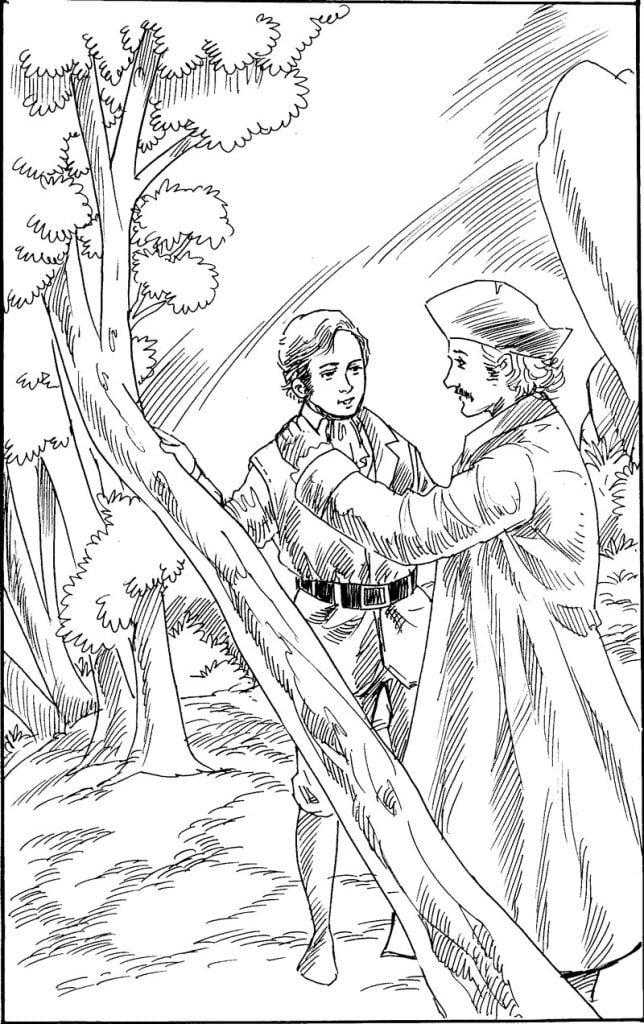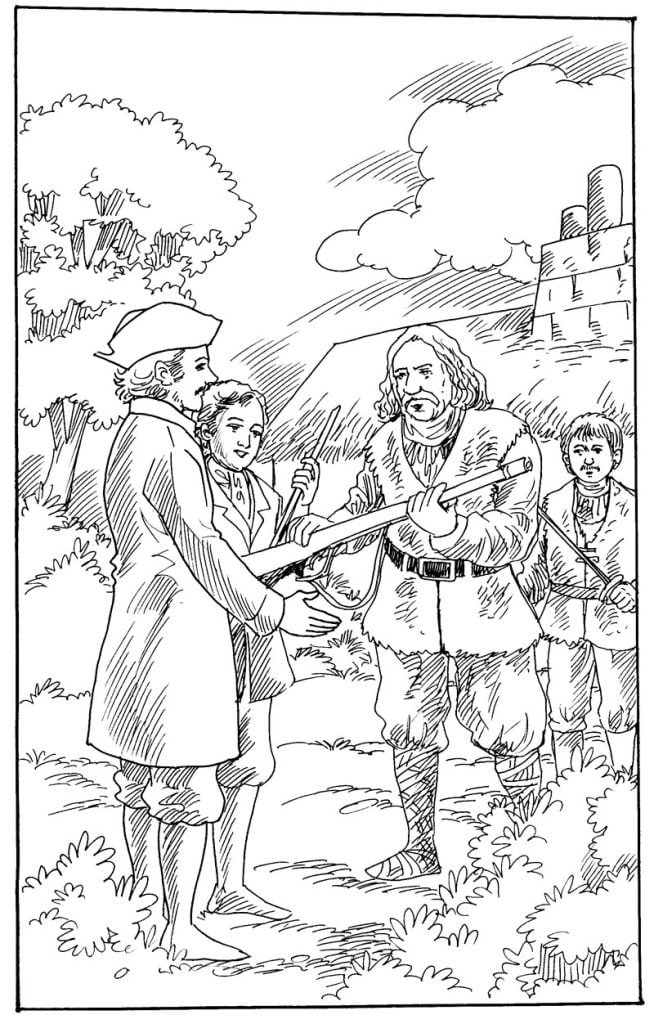Chapter 7
“Well,” said he, “that was a hot chase, David.”
I said nothing. I had seen murder done and a great, ruddy, jovial gentleman struck out of life in moment. Here the man that Alan heated was murdered. Here was Alan skulking in the tree and running from the troops. The way saw it the only friend I had in that wild country was blood-guilty. I could not look at him.
“Are you still tired?” he asked again.
“No,” said I, with my face still to the ground, “You and I must part,” I said, “I like you very well, Alan, but your ways are not mine.”
“I will hardly part from you, David, without some kind or reason,” said Alan very gravely.
“Alan,” said I, “you know very well that Campbell lies in his blood, murdered.”
“I will tell you, Mr. Balfour of Shaws, that if I were going to kill a gentleman, it would not be in my own country, to bring trouble on my clan.” He took out his dirk and laid it on his hand in a certain manner. “I swear upon the Holy Iron I had neither part nor art, act not thought in it.”
I offered him my hand. At first he would not take it. He looked at me awhile, then gave me both of his hands, saying surely I had cast a spell upon him, for he could forgive me anything. Then he grew very grave and said we both must flee that country. He, because he was a deserter, and I, because the troops involved me in the murder.
“O man, you shall walk many a weary mile before we get safe. But if you ask what other chance you have, I answer: none. Either take to the heather with me, or else hang.”
“I’ll go with you, Alan,” said I.
Looking out between the trees, away at the far end of the mountain, little red soldiers were dipping up and down over hill and hollow.
Alan watched them, smiling to himself.
“Oh,” said he, “they’ll be weary before they’ve got to the end of that search. And so you and I, David, can sit down and eat a bite and breathe a bit longer.”
Partly as we sat, and partly on the way, each of us told his adventures.
Alan had run to the bulwarks as soon as the wave was passed, and he saw me and lost me and saw me again clinging to the mast. This put some hope in him that maybe I would get to land after all. It made him leave those clues and messages which had brought me to that unlucky country of Appin.
Those still on the brig had got the lifeboat launched, and one or two were on board already. A second wave heaved the brig out of her place. She struck on some edge of the reef, and the water began to pour into the ship like the pouring of a dam.

Once ashore, Hoseason was after Alan for his money belt because he had lost his ship, but Riach had stood by Alan and he made a run for it.
“You see. There’s a strip of Campbells in that end Mull, which is no good company for a gentleman like me,” said he, “if it had not been for that I would have waited and looked for you myself and stayed to help that little man, Mr. Riach.”
Night fell as we were walking. Alan pushed on. I could not see how he knew where he was. We came to a hilltop and saw lights below us. A house door stood open and let out a beam of fire and candlelight. Five or six persons hurried about.
“James has lost his wits” said Alan, “If we were soldiers, he would be in a bonny mess.”
He whistled three times in a particular manner, and we came down the hill. We were met by a man who cried out to Alan in Gaelic.
“James Stewart,” said Alan, “I will ask you to speak in Scotch, for here is a young gentleman with me who knows no other language. I am thinking it will be better for his health if we don’t mention his name.”
James of the Glens greeted me, then he turned to Alan.
“This has been a dreadful accident,” he cried, “It will bring trouble to the country.”
“Hoots!” said Alan, “Colin Roy is dead, and be thankful for that!”
“Oh,” said James, “It was all very fine to boast before. But now it’s done; who’s to bear the blame? O man, O Alan! You and I have spoken like two fools!” he cried, “For with all that I have said and that you have said, it will look very black against us. Do you mark that?”
“Yes,” said Alan, “I see that.”
“Alan, I have a family. And Alan, it’ll be a jury of campbells. They’ll hang both of us.”
Each clan protected its own. James and Alan would not think of betraying the real murderer, whoever he was. Since Alan and I suspected and were on the run, it seemed we were to take the blame. There soon would be posters up for our arrest. The only hope we had was that James and his family would be safe while the law and those little red soldiers were after Alan and me.

The family gave us each a sword and pistol, some ammunition, a bag of oatmeal, an iron pan and a bottle of French brandy. We had little money; Alan’s belt had been taken for other uses.
Alan turned to me and said, “Tomorrow there’ll be a fine riding of soldiers and running of redcoats in Appin. You and I should be gone.”
Sometimes we walked, sometimes ran. As it became morning, we walked less and ran more. Alan stopped at houses along the way to pass the news. In that country, this was so much of a duty that Alan took the time to do it even while fleeing for his life.
We were far from shelter at the first peep of morning.
“This is no fit place for you and me,” Alan said, “This is a place they’re bound to watch.”
“This is a place they’re bound to watch.”
With that we ran harder than ever. We came to the waterside in a part where the river was split by three rocks. Alan looked neither right nor left, but jumped clean to the middle rock and fell there on his hands and knees. I followed him, and he caught and stopped me.
When I saw there I was, there came on me a deadly sickness of fear, and I put my hand over my eyes. Alan took me and shook me then. Putting his hands to his mouth, and his mouth to my ear, he shouted,
“Hang or down!” He then leapt over the rest of the stream and landed safe.
I bent low on my knees and flung myself forward, but my hands slipped. Alan seized me, first by the hair and then by the collar, and dragged me to safety.
He said nothing, but set off running again for his life. I stumbled after him. He led the way to a large rock. Alan stood on my shoulders, so he could reach the top. Then, he pulled me up. There was a hollow in its centre where we could lie and not be seen. It was daylight now.
“You’re not very good at the jumping,” he said.
I blushed.
“Hoots! Small blame to you! To be afraid of a thing and yet to do it is what makes the prettiest kind of a man. Go to sleep, lad, and I’ll watch.”
Alan woke me roughly, pressing a hand over my mouth. I looked around. About a half a mile up the river there was a camp of red coats. Near by, on the top of a rock, there stood a sentry, with the sun sparkling on his gun.
I took one look and ducked down again into my place.
“You see,” said Alan, “this was what I was afraid of, David.”
We had to lie on the rock and hide till night. The sun beat down and the rock burned us. All the while, we had no water, only raw brandy for a drink, which was worse than nothing.
The soldiers kept moving all day in the bottom of the valley. They changed guard and formed patrolling parties that hunted among the rocks.
At about two, the sun was too hot to bear.
“As well one death as another,” said Alan and slipped over the edge. Dropping to the ground on the shadowy side of the rock. I followed him at once. I was weak and dizzy. We lay there for an hour or two, then began to slip from rock to rock, crawling flat on our bellies or making a run for it. A man needed a hundred eyes in every part of him to keep hidden in that country.
The moon rose at last. We were still on the road. We came to a string of mountains. And Alan seemed pleased; we were safe for a bit. He must have judged that we were out of the earshot of all our enemies. For

